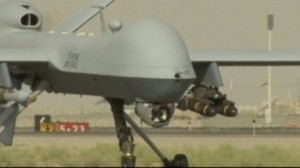Special to WorldTribune.com
AMMAN — The United States has launched unmanned aerial vehicle
strikes on Sunni rebels in Iraq.
Diplomatic sources said the U.S. military was conducting UAV strikes on
Sunni rebels in Iraq’s largest province, Anbar.

They sources said the Americans were working with the Iraqi military in identifying and targeting alleged strongholds of Al Qaida’s Islamic State in Iraq and the Levant (ISIL).
“The U.S. military is operating the UAVs in an arrangement similar to what has taken place in Yemen,” a source said.
The sources said the UAV operations began in mid-January amid the Sunni revolt in Anbar, which borders Jordan and Syria. They said the Iraqi military would also be trained to operate less advanced UAVs later this year.
The UAV strikes were said to have failed to dislodge ISIL from Anbar.
On Jan. 18, ISIL is said to have repelled the Iraq Army and tightened its control over Fallujah, a city of 300,000.
“I wouldn’t give up on Iraq yet though,” U.S. Gen. Martin Dempsey, the
chairman of the Joint Chiefs of Staff, said. “It’s a little premature to
declare that this conflict in Ramadi and Fallujah portends the collapse of the
state of Iraq or an irreversible setback.”
The U.S. air strikes came in wake of warnings by the government of Prime
Minister Nouri Al Maliki to Washington. The sources said Al Maliki
threatened the administration of President Barack Obama that Baghdad was
prepared to accept direct military assistance from neighboring Iran rather
than accept the loss of Anbar.
The administration has not confirmed reports of UAV strikes in Iraq. On
Jan. 17, the Defense Department said it would oversee the export of several
thousand assault rifles to the Iraq Army by next month.
“We don’t actually gain leverage over the Iraqis by withholding these
systems,” a senior U.S. official said. “We tend to cede that leverage to our
strategic competitors.”
The sources said the Iraqi military was also receiving weapons and
combat platforms from Russia. They said the platforms included the Mi-28
attack helicopter, a leading element of a $4.2 billion arms deal with
Moscow.
Over the last few months, Al Maliki has demanded that the United States
supply the AH-64 Apache attack helicopter. So far, many in Congress have
expressed concern that the Apache could end up in Iran, regarded as the
leading ally of Shi’ite-dominated Baghdad.

You must be logged in to post a comment Login